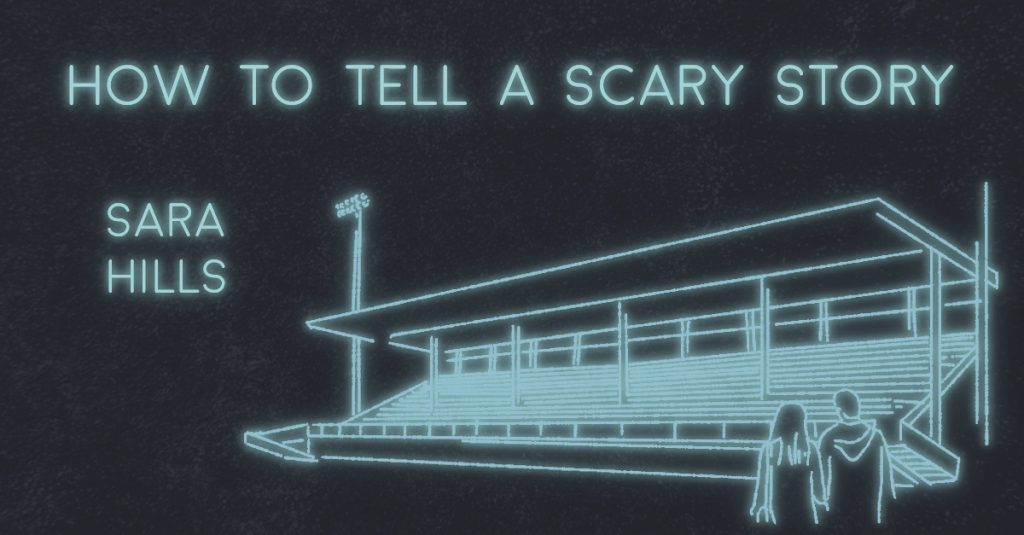Start with setting
Think about someplace you know. A lonely walk to school, the back alleyways downtown, the dark crevices under the high school bleachers, a house from your childhood. Remember the sodium-yellow haze over the empty parking lot that time in college when a rugby player refused to get out of your car, and decide, instead, to catch the reader off-guard. Think about places that should be more comforting and familiar—a clean ribbon of asphalt under a cloudless sky, the upstairs bathroom at a family Christmas party, a sleepover at your best friend’s house, a city bus.
Add in the sounds—the cheering crowd, the seventeenth rendition of Jingle Bells pounded on the piano by your niece, a sharp inhale through a cigarette, a coffined silence, the steady drip from a leaky tap; the smells—pine toilet cleaner, car exhaust, whiskey and vomit, buttered popcorn—know you’ll come back to these details later and wonder which ones are worth telling.
Choose a protagonist
Pick someone likable, sympathetic; or not. A small girl whose yellow sundress tickles the tops of her knees, a teenager in ripped jeans on her way home late from school. Make her 32, a spinster, a mother. Make her thin as a mint Girl Scout cookie. Make her fat with thighs that rub together under her skirt. Give her glasses or a briefcase, let her clothes inform the time period—a chunky bow in her hair says 1983, a Holly Hobby lunchbox says 1979, a flannel shirt and ripped jeans says grunge, 1992. Make her proud or shy, make her a cookie-baking grandmother of four, or a boy with gapped teeth and a hole in his heart. A widower with three children at home. Make them hungry, unsuspecting, naive. Make them a little bit like you. Make them kind to kittens and afraid of breaking the rules. Or not.
Craft a villain
Surprise the reader; make them nonthreatening, approachable. Make them a teacher with a drawer full of snacks, a benevolent uncle, the older brother of your best friend. Remember drunk teenage boys in dark houses, fathers addicted to pills, neighbors with a new game to play. Pluck them out of thin air. Give them a uniform—a police officer, a postman, a soldier, a doctor, a nurse. Think about the possibility of female villains. Controlling mothers who can reduce a child to the size of a tick with one glance, ready to pop you if they hear one more distasteful word. Angry teachers who make you call them ‘Miss’ and send you to sit in the hallway for being helpful. Decide it could be any one of them.
Choose a weapon
Start with what you know. Remember your mother’s pinched face and her open palm, your brother’s fists, your dad’s loaded pistol in the bedside table. Remember the boy who chased you home from school with a big stick, how fast you ran. Think legendary weapons—Thor with his mighty hammer, Medusa’s eyes, Midas’s touch—and wonder about touch as a weapon. Remember all the times your blood felt like it had stopped, clotted to stone, how your legs didn’t move—couldn’t. Think of celebrities’ accusers, think of girls in alleyways behind dumpsters, think of machetes and acid and knife attacks and bombs, and think how easy it would be to go quickly. Think of an unexpected weapon, the thing most villains have in common. Write ‘penis.’
Employ rising action. Quicken the pace.
Let your mind rest on the crocheted doll on the back of the toilet, her plastic smile, the exploded lunchbox with the blue thermos rolling into the bushes, the white-and-pink globs of bubble gum pressed under the bleachers, the empty beer cans, chocolate wrappers, the posters of boy bands on the walls. Recall the smells, you always do, the sound of laughter, disparaging remarks. Try not to cry.
The denouement
After, let your protagonist live. Fasten the memory like a tiny shadow tucked inside a heart, a womb, until it gnaws its way out. Let them tell no one what happened, or let them tell everyone. Have them whisper it to their diary, their best friend, their mother. Try to remember how the shards of words can catch in a throat; seeing yourself reflected in your mother’s eyes when you told her—how distorted you felt, how dirty, how broken—and make your protagonist look away. Crimson their skin with shame until it feels bruised. Let them pray for help, for forgiveness, for death, for justice that never ever comes.
Let no one believe them.
Let it happen again.

